Location and Date:
Tuesday, August 4, 2015, 5 PM, LC 201
Abstract:
Energy has emerged as a dominant theme of research innovation in the past few years; the goal is to improve the efficiency and lower the cost of current technologies and to develop and optimize economically attractive clean energy technologies that minimize the dependence on fossil fuels (e.g. renewable energy). The role of materials design and process systems engineering in achieving sustainable processes is demonstrated through two research topics.
The first topic describes utilization of nanoparticles for enhanced oil recovery (EOR). If located at the interface of two immiscible liquid phases (e.g oil and water), nanoparticles can decrease interfacial tension, prevent coalescence, reduce viscosity, and consequently enhance oil extraction and decrease the operational cost. However, the classical phenomenological description of complex fluids does not capture behavior of these systems during the oil extraction process. The efficiency of EOR depends on the processing history, nature of the fluid/fluid movement, and the geological formation, and therefore varies in space and time. This work aims at fundamental understanding how particles behave under different processing conditions and different confinements, in order to be able to design the most suitable ones. This research builds on our recently developed experimental tools which allows imaging of sample morphology in 4-D under well-defined macroscopic flow fields, and has a significant promise to reveal a mechanistic understanding of these systems at an unprecedented level of detail.
The second research topic deals with the design and development of a multilayer control and optimization structure for hybrid energy systems. The 10kW hybrid energy system built in Sarnia, Ontario is designed and modeled in a modular approach for all components. The low level, predictive and regulatory controllers were designed as a base layer for the supervisory, optimization-based power management structure. Two optimization strategies are utilized as the supervisory controller to determine the optimal set-points for low level controllers, address weather intermittency, and handle economic objectives and operational limits in a systematic manner. The effectiveness of the proposed control strategies is demonstrated through proof-of-concept simulation studies.
About the Speaker:
Milana Trifkovic is an Assistant Professor in the Department of Chemical and Petroleum Engineering at the University of Calgary. Prior to joining University of Calgary in 2013, she was an NSERC Postdoctoral Fellow at Chemical Engineering and Materials Science Department at the University of Minnesota. She obtained her Masters and PhD degree from the Department of Chemical Engineering at the University of Western Ontario. She has served on organizing committees for provincial and national level chemical engineering conferences. Research interests of Milana Trifkovic are in the areas of mixed-integer and logic-based optimization, stochastic programming, process synthesis and material design for energy systems applications. Her research efforts have resulted in numerous journal publications, conference presentations and a patent.
